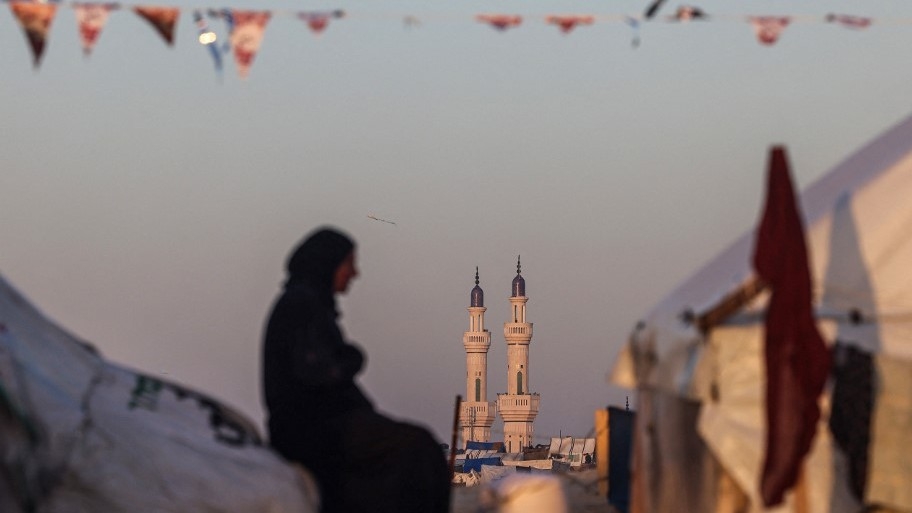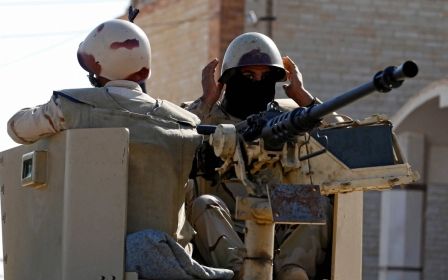'Egypt is aiding Israel': The Palestinians charged a fortune to escape Gaza's war

After more than five months of a deadly war, displacement and starvation, Zain Ali* gave up on the hope of an upcoming ceasefire or an end to the Israeli war on Gaza.
Ali, 31, made a decision considered by many Palestinians a luxury - leave the war-torn Gaza Strip to protect the lives of his wife and three young children.
Such a decision, however, is costly, both financially and mentally.
Ali had to pay $15,000, in what is referred to as a “travel coordination fee”, to a travel agency liaising with an Egyptian state-linked company to allow his family to leave Gaza via the Rafah border crossing in northeastern Egypt.
This is curently the only way for Palestinians who do not have another nationality to cross to Egypt.
Stay informed with MEE's newsletters
Sign up to get the latest alerts, insights and analysis, starting with Turkey Unpacked
The Gaza travel company acts as an intermediary between the Palestinians wishing to leave Gaza and an Egyptian company, Hala, which has a de facto monopoly over the exit of Palestinians via the Rafah crossing.
The crossing is the only way out of Gaza that is not directly controlled by Israel. All other Israeli-controlled crossings have been shut down since the beginning of hostilities on 7 October.
Despite having a stable job at an international NGO prior to the war, Ali was not able to afford the exit fees on his own. He already lost his savings after his displacement from the north to the south of Gaza.
So he relied on fundraising by members of his family abroad, who were able to secure the amount for his family.
However, the money he received was not enough to pay his own escape fees. Only his family crossed to Egypt in February while he remained on the other side of the border.
“I am trapped in Gaza, facing the risk of death everyday by Israeli bombardment. I don’t know if I will ever give my children another hug,” he told Middle East Eye.
“Even if I never see them again, at least I know I tried my best to be a good father and spare them the tragedies of the upcoming days,” a tearful Ali told MEE, showing the last picture he took with his family on his phone.
The average daily wage in Gaza prior to the war was $15, which results in an annual average wage of just above $5,000 if a Palestinian in Gaza was to work 365 days a year. The price of the exit fee is therefore higher than the average annual wage in Gaza.
This service has been an option only for the rich, the ones who paid their life savings to leave, and those who secured the fees through fundraisers.
Ali showed MEE the $15,000 invoice paid in cash to al-Amany travel company in Gaza to allow his family to leave.
He explained that he paid $12,000 for his wife and $1,000 for each child, for a fast-track service that enabled them to leave within 48 hours. The other option he had was to pay $5,500 per adult and $2,500 per child to leave within 2-3 weeks.
Hala, one of several companies under the Organi Group owned by influential Egyptian businessman and Sinai tribal leader Ibrahim al-Organi, has wielded significant control over the movement of people via the Rafah crossing even before the war.
Organi is an ally of President Abdel Fattah el-Sisi and the Egyptian army, and is widely considered the most influential tribal and business figure in the Sinai peninsula, Middle East Eye has revealed.
MEE has contacted the Organi Group and the Egyptian government for comment, but had not received a response by the time of publication.
Company making millions
Before the war, Hala charged travellers $350 per person to enter Egypt, but the price has increased 14-fold since the Israeli war on Gaza started on 7 October.
There's currently a different price tag for Palestinians, Egyptians and refugee document holders.
Palestinians are charged $5,000 per adult and $2,500 per child. Egyptians are charged $650 per adult and $350 per child, while refugee document holders are charged $1,200 per person.
The company is now estimated to make a minimum of one million dollars every day with an average of 300 travellers added to their daily “VIP” list.
People seeking to pay the exit fees queue in front of Hala’s office in Nasser City in Cairo from 5am everyday, a Palestinian who was trying to add his family to the list last week told MEE on condition of anonymity.
Hala only allows registering names in Egypt by an immediate family member or by in-laws who are already in Egypt.
Otherwise Palestinians from Gaza have to go through representatives of Hala in Gaza to have their names approved for the exit list. Travel agencies liaising the coordination business of Hala in Gaza include Hamad Star, Mushtaha and al-Amany.
'There should be no advantage taken out of this situation for monetary gain'
- Egyptian foreign minister Sameh Shoukry
Egyptian foreign minister Sameh Shoukry has denied his government condoned the coordination fees charged by Hala.
In an interview with Sky News last month, he said his government “is already looking into it and will take action vis-a-vis anyone who has been implicated in such activities".
“There should be no advantage taken out of this situation for monetary gain," he said.
The coordination fee covers the “service” of adding the names of Palestinians to a list of people who are given permission to cross the borders between Egypt and Gaza.
The list, called the Hala list, is published online by a Facebook page dedicated to Rafah crossing news, every night at around the same time with names of those travelling the next morning.
The prices vary for this service ranging from at least $5,000 per adult and $2,500 per child with a waiting period of 3-4 weeks, which can be shortened to one week with an additional payment of $500 per person.
The service also includes a “VIP” fast track option which is exclusive for women and children under 14. In February, the prices for the VIP service ranged from $12,000 per adult woman and $1,000 per child with a waiting period of 48 hours.
However, the fees paid do not guarantee the permission to leave Gaza, as Israel has yet to approve or deny the permission given to Palestinians by Egypt.
'A bribe to live'
Just like Ali’s family, many families could not afford paying the fees to all their family members and ended up prioritising the children, elderly and the sick.
Another Palestinian from Gaza, Amna*, 34, told MEE that she was morally against paying a “bribe” to escape war.
“At times of war, a business built on the fear of death should be banned, and the borders should be open to everyone regardless of how much money they can secure,” she said.

But Amna added that even though she felt she would be encouraging and supporting such a business, she had no other choice.
“Guess what? I had to do it for my mum. She is 74 years old and has diabetes and cardiac disease. Being in this war is just making her conditions worse,” she told MEE.
Amna and her siblings, one is based in Egypt, put their savings together and paid $10,000 ($5,000 per adult) to Hala in Egypt for the exit of her mother and sister via the Rafah crossing.
The exit was organised within 10 days by Hala, which also arranged for a bus ride to Cairo.
“The ugliness of this world left me with no other options,” she said.
“I cannot blame Palestinians for paying to leave, but I blame the world. It is no longer a secret that we are paying a ‘bribe’ to live and to run away from bombs,” she added.
Meanwhile, Zain’s wife, Sama*, accused Egypt of profiteering from the war on Gaza by charging Palestinians an exorbitant price to leave.
"We all know that the Egyptian government has no problem for us to come to Egypt. But it seems that the issue is they do not want it for free," she said.
"Unfortunately, Egypt is aiding Israel by making the blockade even harder for Palestinians during the war," she added, also blaming Egypt for failing to pressure Israel to allow the entry of humanitarian aid into Gaza.
"They are helping Israel not just by not letting people travel, but also by not standing against Israel's attempts to starve the Palestinians in Gaza."
The pain of separation
MEE spoke with Sama after she arrived in Egypt with her three children in February.
“I left Gaza, but my heart is still there,” she said.
“It is hard to feel safe and happy because we were just there last week and we know exactly how difficult it is. For us to be here knowing how loud and close the bombings are to Zain makes our hearts heavy,” she added.
'I just want my children to be safe and live in peace'
- Sama, Palestinian mother of three
Sama, 29, said she did not only leave her husband behind. She left her parents, siblings, nieces and nephews without having a last chance to say goodbye.
“I have not seen one of my sisters since the start of the war because she could not leave the north of Gaza. The last time I saw the rest of my siblings was during the last ceasefire.
Sama said she only managed to see her mother for less than 15 minutes two days before leaving the enclave.
“Deep inside my heart, I know that I will never be able to meet them again like we used to,” she said.
“But I just want my children to be safe and live in peace.”
*Names changed to protect the identity of the interviewees.
Middle East Eye delivers independent and unrivalled coverage and analysis of the Middle East, North Africa and beyond. To learn more about republishing this content and the associated fees, please fill out this form. More about MEE can be found here.





.jpg.webp?itok=r2pApoNZ)